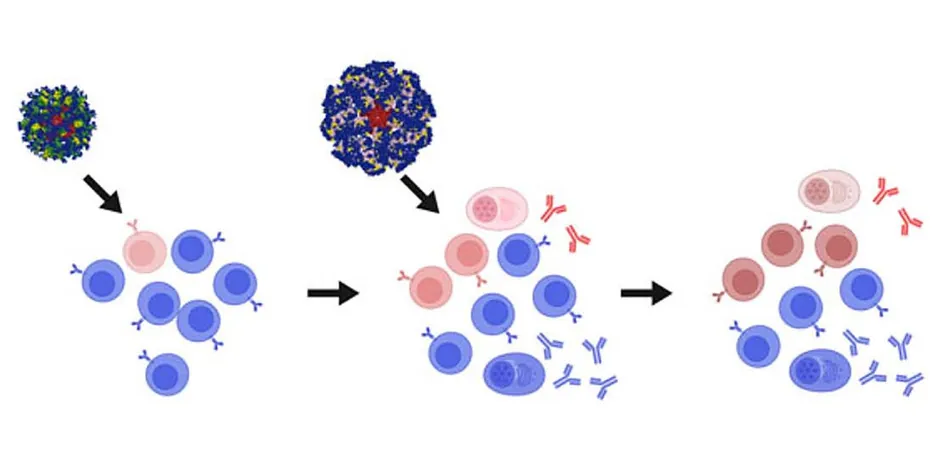
Breakthroughs in HIV Vaccine Research: A Promising New Era
2025-05-28
Author: Yu
Pioneering Steps Toward an HIV Vaccine
As HIV Vaccine Awareness Day approaches on May 18, groundbreaking revelations emerge: two research teams have made significant strides in developing an HIV vaccine that aims to train the immune system to generate specialized antibodies against the virus.
Exciting Findings from New Studies
Published in the journal *Science*, these studies underscore the potential of engineered immunogens to prompt the production of precursor immune cells capable of generating broadly neutralizing antibodies (bnAbs) that can tackle various HIV strains. One of the trials, particularly impactful, took participants from Africa, a region most affected by the epidemic.
Dr. William Schief from Scripps Research explained, "For the first time in humans, we demonstrated that we can initiate the immune response with one shot and amplify it with a second. These trials pave the way for a stepwise strategy in eliciting customized responses, not only for HIV but for vaccines across the board."
Decades of Struggle Against HIV Vaccines
Over 30 years, the hunt for an effective HIV vaccine has seen limited success. With many traditional vaccine candidates falling flat in large clinical trials, the consensus is clear: it’s time for more innovative methods.
The Science Behind Germline Targeting
Interestingly, individuals infected with HIV do produce antibodies, but these typically target highly variable virus sections, making it difficult to recognize new mutations. Meanwhile, a select few naturally produce bnAbs targeting the virus's conserved regions. Researchers are now leveraging germline targeting—a strategy using sequential vaccines to develop specialized B cells for producing bnAbs.
Innovative Vaccine Designs Show Promise
Schief's team engineered an exciting new immunogen called eOD-GT8 60mer, composed of 60 copies of HIV's gp120 protein linked to a nanoparticle. Previous testing in 2022 indicated that this vaccine could stimulate precursor B cells capable of producing VRC01-like antibodies, a critical defense mechanism against HIV. Their latest findings, derived from a specific mRNA-form of the vaccine followed by a booster, revealed incredible potential in guiding B-cell maturation.
Promising Results from Phase I Trials
The initial Phase I trials, IAVI G002 and IAVI G003, showed that participants responding to the primer and booster developed VRC01-class antibody reactions, with many displaying elite responses linked to bnAb development. Remarkably, 94% of participants in IAVI G003 also exhibited immune responses similar to those in IAVI G002, underscoring the effectiveness of this new approach.
Fascinating Developments in Related Studies
In parallel, Amsterdam University researchers tested a different germline-targeting immunogen, BG505 SOSIP.v4.1-GT1.1, which also induced bnAb precursors in many participants, some of which were structurally akin to VRC01 and showed effectiveness in neutralizing laboratory pseudoviruses.
Cautious Optimism Amid Side Effects
While the vaccines generally demonstrated tolerable side effects, some participants did report mild to moderate skin reactions. Alarmingly, about 10% of participants in IAVI G002 experienced persistent chronic hives, a concern that requires further investigation.
Navigating Challenges Ahead
Success in these trials, however, is just the beginning. Researchers have yet to confirm whether these novel vaccines can protect against HIV exposure in animal models or, more importantly, in humans. Furthermore, the availability of highly effective pre-exposure prophylaxis complicates vaccine trials, posing fresh challenges in the pursuit of a widely accessible vaccine.
Hope on the Horizon for HIV Research
Despite the hurdles, germline targeting may unlock avenues for therapeutic vaccines that could generate bnAbs in those already living with HIV, representing a critical step towards long-term remission or even a functional cure.
 Brasil (PT)
Brasil (PT)
 Canada (EN)
Canada (EN)
 Chile (ES)
Chile (ES)
 Česko (CS)
Česko (CS)
 대한민국 (KO)
대한민국 (KO)
 España (ES)
España (ES)
 France (FR)
France (FR)
 Hong Kong (EN)
Hong Kong (EN)
 Italia (IT)
Italia (IT)
 日本 (JA)
日本 (JA)
 Magyarország (HU)
Magyarország (HU)
 Norge (NO)
Norge (NO)
 Polska (PL)
Polska (PL)
 Schweiz (DE)
Schweiz (DE)
 Singapore (EN)
Singapore (EN)
 Sverige (SV)
Sverige (SV)
 Suomi (FI)
Suomi (FI)
 Türkiye (TR)
Türkiye (TR)
 الإمارات العربية المتحدة (AR)
الإمارات العربية المتحدة (AR)